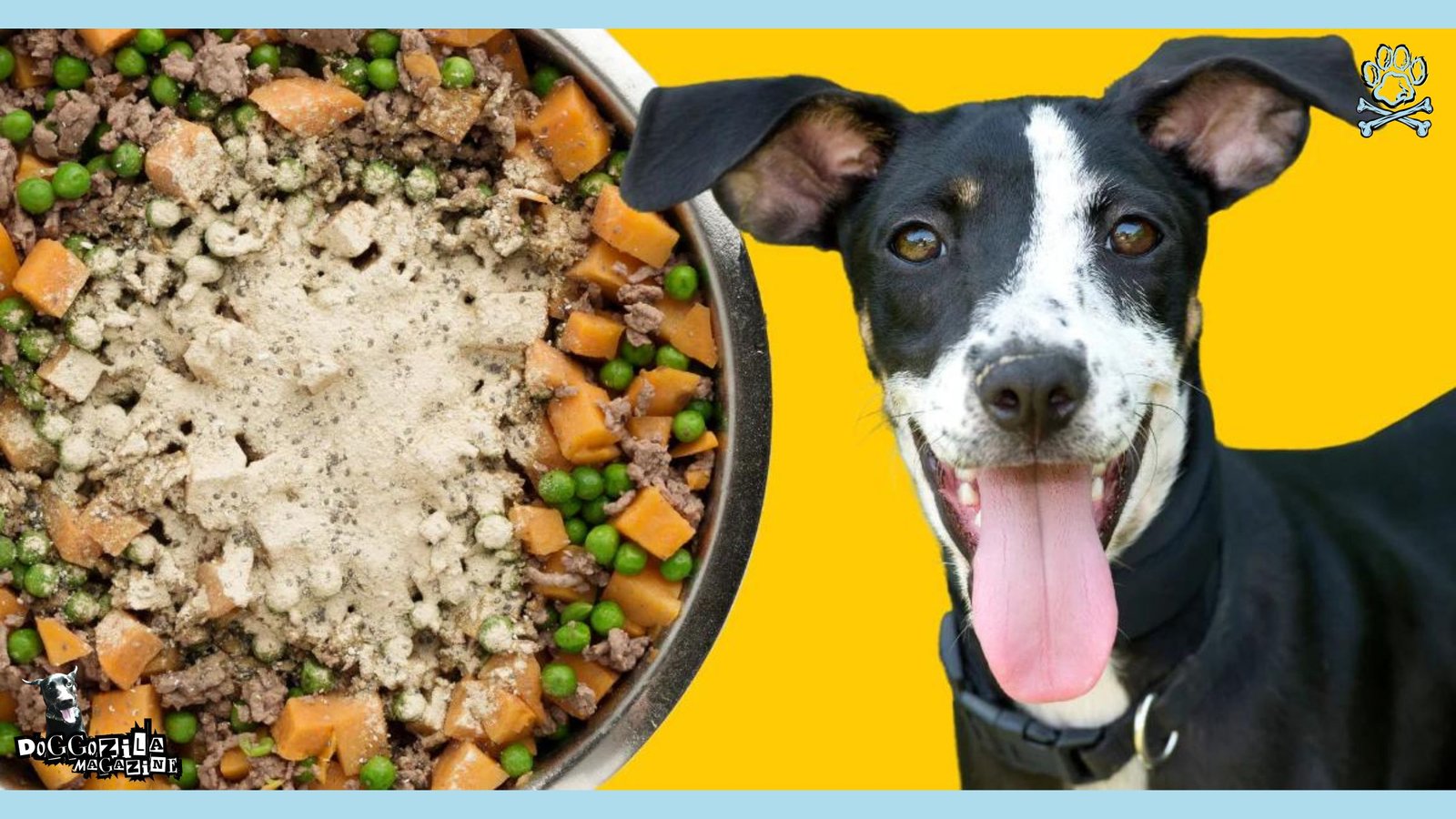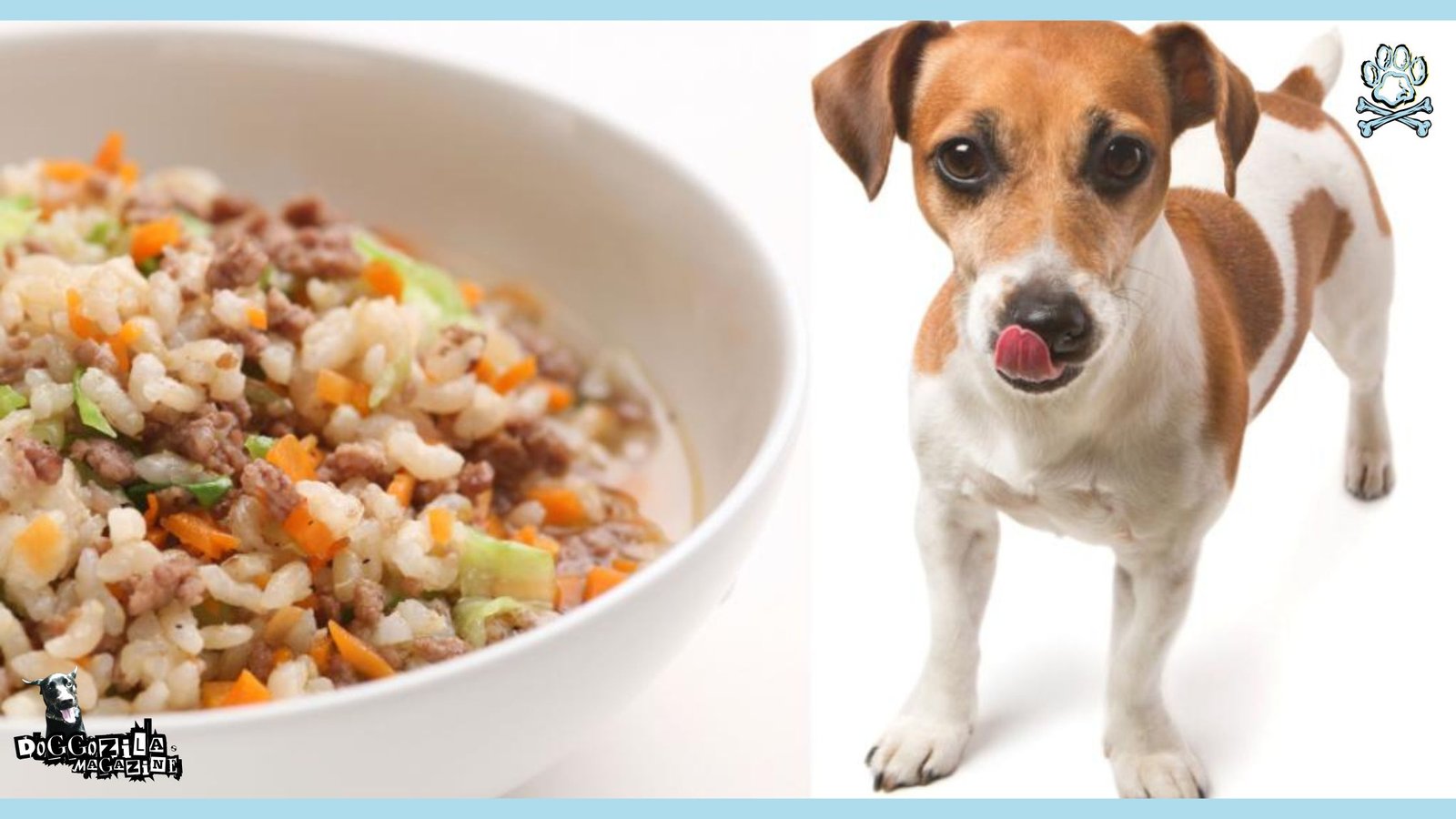
WHY HOMEMADE DOG FOOD MATTERS FOR EVERY DOG AND OWNER
The personal touch when you are preparing homemade food for your dog creates ability to tailor the recipe exactly for your dog’s needs. Every dog is unique, which means their dietary needs can vary greatly. One of the biggest advantages of homemade dog food is that it allows you to tailor meals specifically to your dog’s needs. Whether your pup has allergies, dietary restrictions, or just particular preferences, you can customize their diet to keep them happy and healthy.
Healthier Ingredients, Happier Dogs
Commercial dog foods often contain fillers, preservatives, and artificial ingredients that aren’t always the best for your dog’s health. By preparing homemade dog food, you have complete control over the ingredients. This means you can include whole foods like fresh vegetables, lean meats, and grains, ensuring your dog gets the nutrition they need without the unnecessary extras.
Cooking for your dog can be a wonderful bonding experience. Not only will your dog appreciate the delicious meals, but the effort you put into creating these meals strengthens the bond between you. Plus, knowing that you’re providing the best possible care for your furry friend brings a sense of joy and accomplishment.
Homemade Dog Food is Cost-Effective and Flexible
Though it may seem like a luxury, making homemade dog food can actually be quite cost-effective. Buying ingredients in bulk, utilizing leftovers, and making large batches to freeze can save money in the long run. Additionally, you have the flexibility to change up recipes based on what’s in season or on sale, offering variety and keeping your dog excited about mealtime.
Remember that homemade dog food is a great way to ensure that your dog receives a nutritious, delicious diet tailored to their specific needs. By avoiding unhealthy additives and building a stronger bond with your pet, you’re making a choice that benefits both you and your dog. So why not give it a try and see the positive changes it can bring to your dog’s life?
Chicken And Rice Dish or Beef and Sweet Potato Stew
One of the most popular homemade dog food recipes is a simple chicken and rice dish. This recipe is not only easy to make but also provides a balanced meal for your pup.
Start by boiling boneless, skinless chicken breasts until they are fully cooked. Then, shred the chicken into small pieces and set it aside. In a separate pot, cook some white rice according to the package instructions. Once the rice is cooked, mix it with the shredded chicken. You can also add some cooked vegetables like carrots or peas to the mixture for added nutrition.
Another great homemade dog food recipe is a beef and sweet potato stew. Start by browning ground beef in a large pot. Once the beef is cooked, drain any excess fat and set it aside. In the same pot, sauté some chopped onions and garlic until they are fragrant.
Add diced sweet potatoes, carrots, and peas to the pot and cook until they are tender. Then, add the cooked ground beef back into the pot and pour in some low-sodium beef broth. Let the stew simmer for about 20 minutes to allow the flavors to meld together.
The Taste of Homemade Dog Food Meals
These are just a few examples of the many delicious homemade dog food recipes that you can try. The key is to ensure that your dog’s meals are balanced and provide all the necessary nutrients. It’s also important to consult with your veterinarian to determine the specific dietary needs of your dog, especially if they have any health conditions or allergies.
By making homemade dog food, you have full control over what ingredients go into your pup’s meals. You can choose high-quality proteins, healthy grains, and fresh vegetables to provide a well-rounded diet. Plus, your dog will love the taste of these homemade meals!
🔑 Key Points: You can customize their diet to keep them happy and healthy. Cooking for your dog is a wonderful bonding experience. Homemade dog food is a great way to ensure that your dog receives a nutritious, delicious diet tailored to their specific needs.

BENEFITS OF HOMEMADE DOG FOOD
There are several benefits to feeding your dog homemade meals. First and foremost, you have complete control over the ingredients that go into their food. This means you can avoid any potential allergens or additives that may be present in commercial dog food.
Tailored Healthy Diet for Your Dog
By sourcing high-quality ingredients, you can ensure that your furry friend is getting the nutrition they need without any harmful substances. Additionally, homemade dog food allows you to cater to your dog’s specific dietary needs. If your dog has any food sensitivities or allergies, you can easily tailor their meals to accommodate these restrictions.
For example, if your dog is sensitive to grains, you can opt for grain-free recipes that use alternative sources of carbohydrates like sweet potatoes or quinoa. Moreover, if your dog requires a specialized diet due to a medical condition, such as kidney disease or diabetes, you can work with your veterinarian to create a homemade meal plan that meets their specific nutritional requirements.
Custom Homemade Dog Food Can Prolong Your Furry Friend Life
You can also adjust portion sizes based on your dog’s age, weight, and activity level. This level of customization ensures that your dog is receiving the right amount of calories and nutrients to maintain a healthy weight and optimal energy levels.
For instance, if you have an active dog who participates in agility training or long hikes, you can increase their portion sizes to fuel their activities. On the other hand, if you have a senior dog who is less active, you can adjust their meals to prevent weight gain and promote joint health.
Why Homemade Dog Food Is Cost-Effective
Furthermore, making your own dog food can be cost-effective in the long run. While the initial investment in ingredients and preparation may seem higher, you can save money by buying ingredients in bulk and preparing large batches of food at once. This not only reduces the overall cost per meal but also saves you time in the kitchen.
Additionally, homemade dog food can potentially save you money on veterinary bills. By providing your dog with a balanced and nutritious diet, you may reduce the risk of certain health issues, such as dog obesity, food allergies, and gastrointestinal problems, which can result in costly vet visits.
Feeding your dog homemade meals offers numerous benefits. From having control over the ingredients to catering to their specific dietary needs and potentially saving money, homemade dog food can be a healthy and cost-effective choice for your furry companion.
🔑 Key Points: It’s important to have a control over the ingredients that go into your dog food. You can also adjust portion sizes based on your dog’s age, weight, and activity level. Homemade dog food can potentially save you money on veterinary bills.

IMPORTANT NUTRIENTS FOR DOGS
Check why some nutrients are important and why your dog needs them to thrive.
Always Start with Protein and Carbohydrates Rich Homemade Dog Food
Dogs are primarily carnivorous animals and require a good source of protein in their diet. This can come from lean meats such as chicken, turkey, or beef. Protein is essential for muscle development, repair, and overall growth. It also helps maintain a healthy coat and skin.
Carbohydrates provide energy for your dog. Opt for healthy options like sweet potatoes, brown rice, or quinoa. They are a great source of fiber, which aids in digestion and promotes a healthy gut. Carbohydrates also help regulate blood sugar levels and can keep your dog feeling full and satisfied.
Use More Fruits and Vegetables
Just like humans, dogs can benefit from the vitamins and minerals found in fruits and vegetables. Some dog-friendly options include carrots, peas, and blueberries. These provide antioxidants, which help boost the immune system and fight off diseases. They also contain essential nutrients like vitamin C, vitamin A, and potassium.
Include In Your Dog Diet Calcium and Fats
Fats are essential for your dog’s overall health and help with nutrient absorption. Use healthy fats like olive oil or coconut oil in moderation. Fats provide a concentrated source of energy and are necessary for the absorption of fat-soluble vitamins. They also contribute to dog’s healthy skin and a shiny coat.
Calcium is crucial for strong bones and teeth. You can add calcium to your dog’s diet through ingredients like yogurt or cottage cheese. Calcium is not only important for skeletal health but also plays a role in muscle function, nerve transmission, and blood clotting.
These nutrients work together to support your dog’s overall well-being and should be included in their balanced diet. It’s important to consult with your veterinarian to ensure that your dog’s specific nutritional needs are being met. With the right combination of nutrients, you can help your dog live a long, healthy, and happy life.
🔑 Key Points: Healthy dogs require a good source of protein in their diet. Dogs benefit from the vitamins and minerals found in fruits and vegetables. With the right combination of nutrients dogs will have balanced and diet.

TOP 3 HOMEMADE DOG FOOD RECIPES
We will give you the three most famous and healthy recipes for homemade dog food. The first is chicken and sweet potato stew, the second is for beef and vegetable stir-fry and the last one is salmon and quinoa delight. Feel free to check them out below!
Recipe 1: Chicken and Sweet Potato Stew
This hearty stew is packed with protein and carbohydrates, making it a nutritious and filling meal for your dog. It’s also incredibly easy to make, requiring just a few simple ingredients and minimal preparation time.
Ingredients:
- 2 boneless, skinless chicken breasts
- 1 sweet potato, diced
- 1 cup peas
- 1 carrot, sliced
- 2 cups low-sodium chicken broth
Instructions:
- In a large pot, cook the chicken breasts over medium heat until no longer pink. This should take about 10-12 minutes. Remove the chicken from the pot and set it aside to cool.
- While the chicken is cooling, prepare the vegetables. Peel and dice the sweet potato, slice the carrot, and measure out the peas. Set the vegetables aside.
- Once the chicken has cooled, shred it into small, bite-sized pieces using a fork or your hands. Set the shredded chicken aside.
- Return the pot to the stove and add the diced sweet potato, sliced carrot, peas, and chicken broth. Bring the mixture to a boil, then reduce the heat to low and let it simmer for about 20 minutes or until the vegetables are tender.
- Once the vegetables are cooked, add the shredded chicken back to the pot. Stir well to combine all the ingredients and allow the stew to simmer for an additional 5 minutes to let the flavors meld together.
- Remove the pot from the heat and let the stew cool before serving it to your dog. This will prevent any potential burns and allow the flavors to develop further.
- Once the stew has cooled, it is ready to be served. You can either serve it on its own as a complete meal or mix it with your dog’s regular kibble to add some variety and extra nutrients.
- Any leftovers can be stored in an airtight container in the refrigerator for up to three days. Before serving any leftovers, make sure to reheat them thoroughly to kill any bacteria that may have grown.
🔑 Key Points: This chicken and sweet potato stew is not only delicious but also provides a well-rounded balance of protein, carbohydrates, and essential vitamins and minerals for your dog. It’s a wholesome and satisfying meal that your furry friend is sure to enjoy!
Recipe 2: Beef and Vegetable Stir-Fry
This stir-fry recipe is not only tasty but also packed with essential nutrients for your dog. Dogs require a balanced diet that includes proteins, carbohydrates, healthy fats, and a variety of vitamins and minerals. This recipe provides all of that in a delicious and easy-to-make dish.
Ingredients:
- 1 pound lean ground beef: Lean ground beef is a great source of protein for dogs. It is important to choose lean cuts of meat to avoid excessive fat content.
- 1 cup broccoli florets: Broccoli is a nutritious vegetable that is rich in vitamins A, C, and K. It also contains fiber and antioxidants that support your dog’s overall health.
- 1 cup sliced bell peppers: Bell peppers are packed with vitamins A and C, as well as antioxidants. They add a nice crunch and vibrant color to the stir-fry.
- 1/2 cup sliced carrots: Carrots are an excellent source of beta-carotene, which is converted into vitamin A in your dog’s body. They also provide fiber and promote healthy digestion.
- 2 tablespoons low-sodium soy sauce: Low-sodium soy sauce adds flavor to the stir-fry without adding excessive sodium, which can be harmful to dogs in large amounts.
- 1 tablespoon olive oil: Olive oil is a healthy fat that provides essential fatty acids and helps with nutrient absorption.
Instructions:
- In a large skillet, heat the olive oil over medium heat. Add the ground beef and cook until browned. Make sure to break up the meat into small pieces for easier digestion.
- Add the broccoli, bell peppers, and carrots to the skillet. Cook for an additional 5-7 minutes, or until the vegetables are tender. Be careful not to overcook the vegetables, as they can lose some of their nutritional value.
- Drizzle the soy sauce over the stir-fry and stir well to coat all the ingredients. The soy sauce adds a savory flavor that dogs love.
- Remove the skillet from heat and allow the stir-fry to cool before serving it to your dog. It is important to let the food cool down to avoid burning your dog’s mouth.
🔑 Key Points: This beef and vegetable stir-fry can be served on its own or mixed with your dog’s regular food. It’s a flavorful and nutritious option that will surely make your pup’s taste buds happy! Remember to always consult with your veterinarian before introducing new foods to your dog’s diet to ensure they are suitable for your pet’s specific needs.

Recipe 3: Salmon and Quinoa Delight
This recipe combines the goodness of salmon and quinoa to create a healthy and delicious meal for your dog. Salmon is a great source of omega-3 fatty acids, which can help promote a healthy coat and skin. Quinoa, on the other hand, is a gluten-free grain that is packed with protein, fiber, and essential vitamins and minerals.
Ingredients:
- 2 salmon fillets
- 1 cup cooked quinoa
- 1/2 cup cooked peas
- 1/4 cup chopped parsley
- 1 tablespoon coconut oil
Instructions:
- Preheat your oven to 375°F (190°C). Place the salmon fillets on a baking sheet and bake for about 15-20 minutes, or until cooked through. Cooking the salmon in the oven helps to retain its natural flavors and nutrients.
- Remove the skin from the salmon and flake the fish into small pieces. Be sure to remove any bones as well, as they can be a choking hazard for your dog.
- In a large bowl, combine the cooked quinoa, peas, parsley, and coconut oil. Mix well to ensure that all the ingredients are evenly distributed.
- Add the flaked salmon to the bowl and stir gently to combine all the ingredients. The salmon adds a rich and savory flavor to the dish, making it even more enticing for your dog.
- Allow the mixture to cool before serving it to your dog. This not only prevents any potential burns, but it also allows the flavors to meld together, resulting in a more delicious meal.
- Store any leftovers in the refrigerator for up to three days. This recipe can be easily scaled up or down depending on the size of your dog and their individual dietary needs.
🔑 Key Points: This salmon and quinoa delight is a nutritious and flavorful meal that your dog will enjoy. It’s a great option for dogs with sensitivities to poultry or beef.
Why Making Homemade Food for Your Dog is the Best Choice
Hopefully this article showed how you could do better by your furry friend when it comes to their diet? Homemade dog food is the answer. That’s why taking control of your dog’s meals can lead to a healthier, happier pup.
One of the main benefits of making homemade food for your dog is knowing exactly what’s going into their bowl. Commercial dog foods often contain preservatives, artificial flavors, and unhealthy fillers. By preparing meals for your dog at home, you can ensure that they’re eating fresh, wholesome ingredients that promote better health.
Every dog is unique, and their dietary needs can vary widely. Homemade dog food allows you to tailor their meals to meet specific nutritional requirements. Whether your dog has food allergies, needs to lose weight, or requires a diet for a specific health condition, customizing their food ensures they get exactly what they need.
When dogs eat better, they feel better. Homemade dog food can improve energy levels, digestion, and even skin and coat health. The excitement and quality time spent during mealtime preparation can also build a stronger bond between you and your pet, leading to overall increased happiness.
Remember to always chat with your veterinarian before introducing any exciting new changes to your dog’s diet, especially if they have any underlying health conditions or allergies.

For more homemade dog food recipes we recommend to visit Damn Delicious or All Recipes.
Bon appétit!









